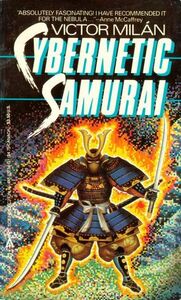You need to sign in or sign up before continuing.
Take a photo of a barcode or cover
The Cybernetic Samurai came into my possession via a second-hand bookshop, a time-honoured example of me picking up the book with the most lurid pulpy title. It opens with Japanese corporate politics in rooftop gardens, and I quickly realised that lurid pulpy title was actually literal. In this 300 page novel, scientists create an artificial consciousness, and inculcate it with the values of a samurai. More corporate politics ensue, until the book kicks off into high-gear about halfway through and erupts into action.
Artificial consciousness TOKUGAWA remains a child-like and malleable personality throughout most of the book, and frankly his character arc reminded me of Edward Scissorhands to quite some extent (nb, the book was published in 1985, several years earlier, but the parallels are striking).
Although the narrative rarely strays far beyond the board rooms and laboratories of Yoshimitsu Telecommunications Company (YTC), the Cybernetic Samurai is set in a post-WW3 dystopia where Japan is an apparent beacon of civilisation amid a crumbling world order that is starved of resources and increasingly desperate.
The novel has much to recommend it. Despite being written in 1985, it has a lot to say about the history of artificial intelligence and the difficulties of its development which are very relevant today. Repeated references are made to "fifth-generation" AI which is considered completely distinct to the artificial consciousness that is TOKUGAWA, and "fifth-generation" seems roughly analogous with the AI tools that we hear so much about currently. There's also some nice stuff about the difficulty of generating true randomness. And the book's characters are an engaging and sophisticated bunch, even if many of them fail to make it to the final chapter.
The editing is slightly sloppy, however, full of slightly strange word choices that almost make it feel like a translated work (it isn't) and typos. No book is perfect, but there were enough errors to drag me back to reality on almost every page.
Victor Milán wrote an important but flawed work which is well worth a look, but falls down in its editing and several plot developments that would be predictable enough even if they weren't telegraphed so blatantly. Apparently there's a sequel (The Cybernetic Shogun), and there is a significant loose end which I assume sets that up, but unless Lloyds of Kew yields another of its occasional unexpected gems, I doubt I'll ever see it, let alone read it.
Artificial consciousness TOKUGAWA remains a child-like and malleable personality throughout most of the book, and frankly his character arc reminded me of Edward Scissorhands to quite some extent (nb, the book was published in 1985, several years earlier, but the parallels are striking).
Although the narrative rarely strays far beyond the board rooms and laboratories of Yoshimitsu Telecommunications Company (YTC), the Cybernetic Samurai is set in a post-WW3 dystopia where Japan is an apparent beacon of civilisation amid a crumbling world order that is starved of resources and increasingly desperate.
The novel has much to recommend it. Despite being written in 1985, it has a lot to say about the history of artificial intelligence and the difficulties of its development which are very relevant today. Repeated references are made to "fifth-generation" AI which is considered completely distinct to the artificial consciousness that is TOKUGAWA, and "fifth-generation" seems roughly analogous with the AI tools that we hear so much about currently. There's also some nice stuff about the difficulty of generating true randomness. And the book's characters are an engaging and sophisticated bunch, even if many of them fail to make it to the final chapter.
The editing is slightly sloppy, however, full of slightly strange word choices that almost make it feel like a translated work (it isn't) and typos. No book is perfect, but there were enough errors to drag me back to reality on almost every page.
Victor Milán wrote an important but flawed work which is well worth a look, but falls down in its editing and several plot developments that would be predictable enough even if they weren't telegraphed so blatantly. Apparently there's a sequel (The Cybernetic Shogun), and there is a significant loose end which I assume sets that up, but unless Lloyds of Kew yields another of its occasional unexpected gems, I doubt I'll ever see it, let alone read it.
There are three eternal truths: death, taxes, and scifi written in the 1980s is going to get weird about Japan.
The Cybernetic Samurai is definitely weird, but in an oddly serious way. The world was seriously wounded but not destroyed in World War 3. Japan came out mostly unscathed, though energy shortages are now chronic, cultural has become increasingly rigid and traditional, and covert warfare between the Zaibatsus and various government agencies threatens peace and prosperity. In this tense environment, Yoshimitsu TeleCommunication has embarked on a secret project to create a truly artificial being lead by the heretical American scientist Elizabeth O'Neill.
The project succeeds, creating an nascent intelligence named TOKUGAWA, which O'Neill instructs in the values of bushido. Stricken with multiple sclerosis, the wheelchair bound O'Neill becomes TOKUGAWA's mother and then lover via a technology of neural synthesis. She works with the elderly CEO Akaji, and has an instant and intense dislike of both of his children: the dissipated son Shigeo and the exiled daughter Michiko, who is a brilliant physicist in her own right.
Whatever plan O'Neill had for TOKUGAWA is cut short, as the powerful Ministry of International Trade and Industry attacks via treachery. O'Neill dies in her lab. Akaji is cut done in his rooftop zen garden, after killing two attacking soldiers with a Muramasa katana. But TOKUGAWA returns Shigeo to power, get revenge on a lot of people, and then romances and serves Michiko, who also becomes a lover, before finally being offered dominion over Japan as the world lurches towards World War 4.
Big heavy topics weigh down this book like stones. Honor, duty, being Japanese, the nature of sentience, family, love. I just wish that there was something a little more interesting to say. The main conflict is between O'Neill and Michiko and their influence on TOKUGAWA, but it happens at a distance, without much interaction with the plot. While this novel is well-crafted, it feels surprisingly pro-forma. Except for the sex scenes. I sort of forgot how horny vintage scifi could get, given that modern scifi tends to gloss it over.
I had a pleasant enough few days, but I love this kind of pulp, and unfortunately The Cybernetic Samurai has gone rusty since it was written.
The Cybernetic Samurai is definitely weird, but in an oddly serious way. The world was seriously wounded but not destroyed in World War 3. Japan came out mostly unscathed, though energy shortages are now chronic, cultural has become increasingly rigid and traditional, and covert warfare between the Zaibatsus and various government agencies threatens peace and prosperity. In this tense environment, Yoshimitsu TeleCommunication has embarked on a secret project to create a truly artificial being lead by the heretical American scientist Elizabeth O'Neill.
The project succeeds, creating an nascent intelligence named TOKUGAWA, which O'Neill instructs in the values of bushido. Stricken with multiple sclerosis, the wheelchair bound O'Neill becomes TOKUGAWA's mother and then lover via a technology of neural synthesis. She works with the elderly CEO Akaji, and has an instant and intense dislike of both of his children: the dissipated son Shigeo and the exiled daughter Michiko, who is a brilliant physicist in her own right.
Whatever plan O'Neill had for TOKUGAWA is cut short, as the powerful Ministry of International Trade and Industry attacks via treachery. O'Neill dies in her lab. Akaji is cut done in his rooftop zen garden, after killing two attacking soldiers with a Muramasa katana. But TOKUGAWA returns Shigeo to power, get revenge on a lot of people, and then romances and serves Michiko, who also becomes a lover, before finally being offered dominion over Japan as the world lurches towards World War 4.
Big heavy topics weigh down this book like stones. Honor, duty, being Japanese, the nature of sentience, family, love. I just wish that there was something a little more interesting to say. The main conflict is between O'Neill and Michiko and their influence on TOKUGAWA, but it happens at a distance, without much interaction with the plot. While this novel is well-crafted, it feels surprisingly pro-forma. Except for the sex scenes. I sort of forgot how horny vintage scifi could get, given that modern scifi tends to gloss it over.
I had a pleasant enough few days, but I love this kind of pulp, and unfortunately The Cybernetic Samurai has gone rusty since it was written.
This novel was first published over 30 years ago, but still has an impact today with its discussion of artificial intelligence, corporate culture and nationalism. Milán also does a deep dive into bushido. This aspect of the book drives the story, but could easily be brought into the present, with some of the new and very different influences in today's global economy. Interesting book.


